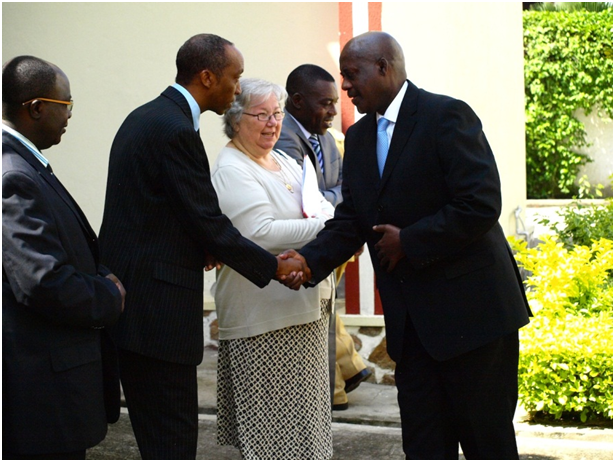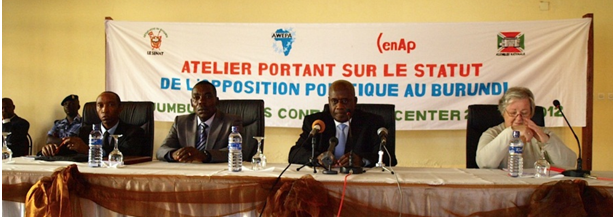Burundi: CENAP engages the extra-parliamentary opposition

Interpeace local partner the Centre of Alert and Conflict Prevention (CENAP), has been engaging Burundian stakeholders on the key challenges to peace in the country since 2007.
Opposition parties have withdrawn from the formal political process
The current political context in Burundi has been shaped by the 2010 electoral process. The 2010 communal election saw a landslide victory of the ruling party CNDD-FDD. The majority of the opposition boycotted the following presidential and parliamentary elections because they suspected manipulation. International and national observers however have not detected any significant irregularities that could have altered the election results.
As a result the opposition regrouped under the Democratic Alliance for Change, the ADC-Ikibiri platform. The opposition does not have an institutionalized space from which to make its voice heard in the political process. Additionally, the government lacks formal points of communication to consult with ADC-Ikibiri parties. The lack of political dialogue has created a tense political climate and has led to the deterioration of the security situation in 2011.
Due to the instability of the political context, the government’s draft law on the status of the opposition could lead to further frustrations. This draft law suggests to assign a special status and privileges to the leader of the opposition party having won the most seats in parliament. Consulting with ADC-Ikibiri on this particular law is vital to ensure all stakeholders have a voice in the process.
CENAP co-facilitates workshop
Pie Ntavyohanyuma, the President of the National Assembly, requested CENAP to facilitate consultations with the extra-parliamentary opposition on the law on the status of the opposition. This workshop, co-facilitated by CENAP and the Association of European Parliamentarians for Africa (AWEPA), was the first official dialogue between all political parties since ADC-Ikibiri boycotted the elections.
Charles Ndayiziga, Director of CENAP, explains: “Dialogue between the ruling party and the political opposition is a crucial component towards stability and peace in Burundi. This workshop is also vital to the credibility of a draft law on the status of the opposition.”
150 Burundians participated
On 28 March 2012, a dynamic turnout of 150 participants attended the event. Participants included Pie Ntavyohanyuma, the President of the National Assembly, Issa Ngendakumana, the Minister of Good Governance and Gabriel Ntisezerana, the President of the Senate as well as top political and civil society representatives. The political parties of the ADC-Ikibiri platform each sent two participants, in addition to representation from other political opposition parties.
First time recognition of important contribution of extra-parliamentary opposition
Former President Sylvestre Ntibantunganya called upon all participants to engage in dialogue: “Dialogue clearly has more advantages than disadvantages. Dialogue is key for Burundi’s progress.”
To encourage further discussion about the draft law on the status of the opposition, the former President presented the roles and responsibilities of the majority and opposition, especially their impact on the consolidation of peace in Burundi.
Ambassador Sebastien Ntahuga, who is the former Director of Conflict Prevention of the Economic Community of Central African States, introduced the similarities and differences of the legal status of the opposition in various European and African countries. He presented different institutional experiences that should be considered in the discussions about the draft law on the status of the opposition.
 The panel (left to right): Charles Ndayiziga, CENAP Coordinator, Gabriel Ntisezerana, the President of the Senate, Pie Ntavyohanyuma, the President of the National Assembly and Lydia Maximus, AWEPA Vice President. Photo credit: CENAP |
Both the government and the extra-parliamentary opposition participated actively in the workshop. Along with the concerns of most participants that the draft law might be unconstitutional, it was also discussed whether it might violate the power sharing agreement between the government and the opposition and between the different ethnic groups as stated in the Arusha Peace Accord.
Need for further dialogue
“Given the trust and legitimacy that CENAP has developed within Burundi, the team continues to prevent and mitigate conflict linked to the current political impasse through inclusive dialogue. This includes developing and agreeing on solutions to the political discord in an inclusive and participatory manner which involves all key political and security stakeholders,” adds Johan Svensson, Interpeace’s Regional Director for Eastern and Central Africa.
